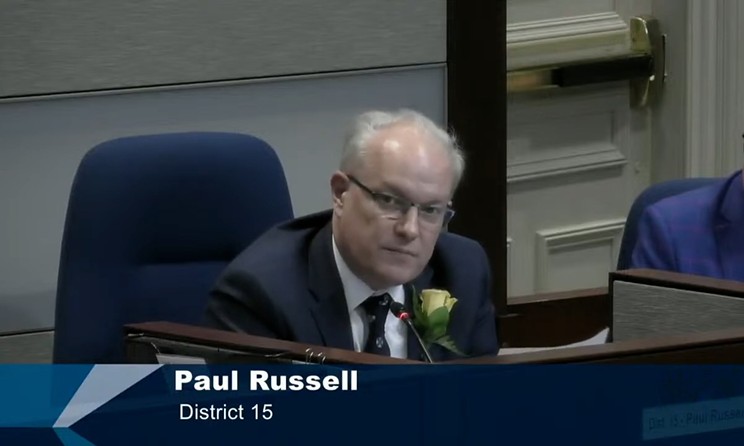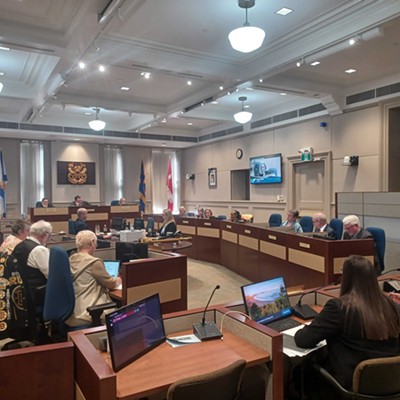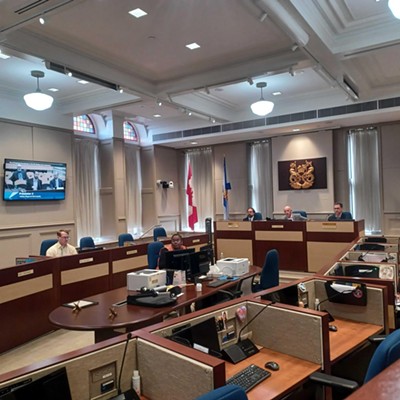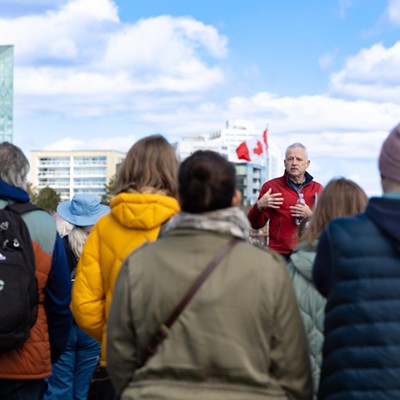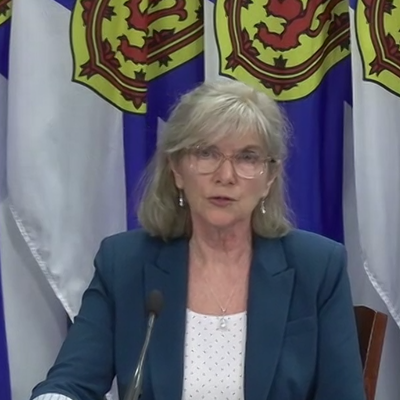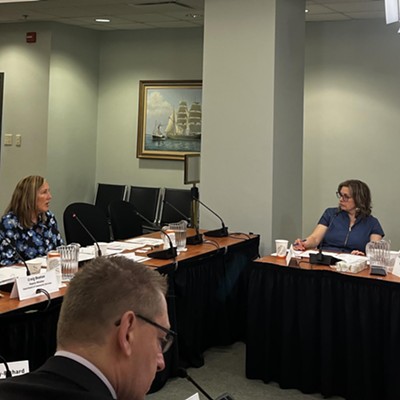The community announcements that start off every city council meeting are normally pretty dull affairs. Announcing events, shouting-out local constituents who went above and beyond in the community, things of that nature. But at Tuesday’s meeting, councillor Paul Russell used his time to announce a diagnosis of cancer. He told council he expects to make a full recovery, but will have to undergo chemo, and will be slightly removed from the public eye for the next couple of months as he focuses on his health.
Russell catches a lot of stick as a city councillor, with local blowhards calling for his resignation as recently as last council meeting. But for all of the stick that Russell gets, he plays a vital role in our society and in spite of his (subjective) faults, he is (objectively) good at his job.
One thing that is always true about councillor Russell is that he cares deeply about the people in Lower Sackville. He is a steadfast champion for the people he represents, and can often be found leading by example.
Good morning! I’m heading in town today, all day, for the last day of the NSFM conference. It’s been a busy and productive week, and I also had the chance to get to the homelessness conference yesterday. Good discussions! pic.twitter.com/zVYWUfGAzU
— Paul Russell (@SackvillePaul) November 10, 2023
Local leadership matters, and it seems to matter a lot to Russell to be doing leadership in the right way.
The other reason Russell is vital to our municipal democracy is the stick he gets for voicing his political positions. Sure, it’s true when he advocates for his beliefs there are often gaffes, like when he asked a conference to change its name because ending homelessness was “not going to happen.” But this is a disconnect often found in right-wing politicians. We all know that premier Tim Houston probably didn’t mean minimum wage jobs aren’t “real jobs,” but instead meant provincial labour laws are designed to make working minimum wage jobs absolute shit, so most of us don’t want to make a career in them. Or when Karla MacFarlane said, as Houston’s community services minister, said that more tents is a “natural evolution of summer,” she likely meant that it’s easier to be failed by the provincial government when the weather is nice, and not that unhoused people were enjoying the “freedom to be outside.”
But unlike their provincial counterparts, when municipal councillors take political positions they then have to articulate support for their ideas. They also have to explain why their ideas are better than those proposed by their peers. That disagreement is not some weird bug of council; it’s actually supposed to be the best feature of democracy. If the ideas Russell advocates for are unpopular, they lose. But we need to talk about these ideas, we need to have these conversations, even if they are hard and unpopular. In fact, if our “progressive” majority of councillors made the same steadfast commitment to their beliefs as Russell does to his, this city wouldn’t need “hell or high water” to become a cycling city.
Mr. Russell, our democracy is stronger because of your steadfast commitment to it, and the people you represent. Please make a speedy recovery, every Don Quixote needs a windmill.
Things that passed
6484 Jubilee Road, 1741-1743 Henry Street, 1745 Henry Street, and 6038 Charles Street are all now official Heritage Properties. There was much rejoicing.
Three years after the city got its defunding-the-police report, council is *not* forming a committee to see if this report can become a reality. Instead of a committee, city staff recommended lining up all the recommendations from the recent police-related studies; The reports Wortley, Mass Casualty, Defunding, et al. and just start doing the work instead. Ultimately city staff believe that a lot of the work that a committee would do, staff could do faster, especially with the soon-to-be-stood up department of public safety coming online early next year. A committee may, in fact, slow things down. Which means, after many iterations of reports all finding the same things, the city might start doing something about it, as this passed unanimously.
Council will start the process of trying and change the bylaws to stop people from infilling the Northwest Arm. Trying, because even if this passes municipally, other orders of government can easily intervene and stop this. When putting this motion on the floor, councillor Waye Mason challenged his colleagues to stop doing this piecemeal as they were currently, and consider coming up with a holistic plan for waterfronts in the HRM. Even though that plan would have the same other order of government interjection caveat. Councillor Sam Austin was worried about Dartmouth, but didn’t want to hold up the protection of the Northwest Arm, so asked for (and got) a separate report asking for the same thing in Dartmouth. After a long discussion where everyone reiterated that this separate Dartmouth report wouldn’t, in fact, delay the Northwest Arm infilling prevention legislation, the report request and start of the Arm Infill legislative process both passed. The infill will get a public hearing ASAP.
City staff are recommending that the city change its bonus zoning program. This used to be a plan where developers in the Centre Plan area could pay into an affordable-housing slush fund if they didn’t want to build a public benefit into their developments. Staff is recommending expanding this program to all areas of the HRM, not just the Centre Plan area. The city also got clarity from the province that this won’t be killed by John Lohr’s power-grabbing Bill 329, because density bonusing was a fee mechanism that already existed, so even though this is a new fee (expanding to new areas) it’s not a novel fee (new fee process for the city). Halifax Water fees remain a sticking point for affordable development because they are quite high and can’t be avoided.
Fun fact about Halifax Water: When they build infrastructure, they try to predict and account for the full cost of that infrastructure over its useful life. This likely drives the fees up, as they would be fees set at the level required for sustainable development. This is something the city of Halifax does not do (but should) with automotive infrastructure and it’s also something the city’s CAO is extremely well versed in, as the former CEO of Halifax Water. Here’s to hoping that this year Brad Anguish’s transportation budget looks extremely different (read: sustainable) for the first time in the city’s history.
The mayor will write the province and request that permanent residents be allowed to vote in municipal elections, and for a dedicated Mi’kmaw council seat. This was pulled off the consent agenda by councillor Tony Mancini for a civics lesson before being passed. The mechanical process of how this change happens legislatively was explained by the city clerks, and the political explanation is in the Notable Debates section below. Since it’s a political question, it’s one staff can’t answer. Councillor Trish Purdy also wanted the same civics lesson, mainly about why it didn’t apply to other protected groups, and there again, it’s political. For voting purposes, this request for a mayoral letter was split into two parts: Giving permanent residents the vote passed with councillors David Hendsbee and Purdy voting no, while the Mi’kmaw seat request passed with only Purdy and Russell voting no.
Council will create a process to shut down school streets to vehicular traffic for child safety during pick-up and drop-off times. This passed on consent, so expect a process on how to make it safer for kids to go to school in the near future.
Councillor Kathryn Morse is asking for a report to figure out how to protect eastern hemlocks from wolly adelgids (an insect pest). Councillor Russell chimed in to make sure Sackville Lakes park was going to be included, and it will. This passed unanimously.
Morse also wants the mayor to write the province for an update on the regulations for the Coastal Protections Act, urging the province to take action. She told her colleagues that this report was done in the spring and would be valuable for municipal planners. This too passed.
Councillor Hendsbee wanted to know if Sheet Harbour’s chamber of commerce can take over the area rate and streetscaping that the city currently does, setting up for Christmas, etc. They can, because this passed.
Notable Debates
During the debate about the protected seat for Mi’kmaw people, councillor Mancini wanted to know why we would want to do such a seat, because there aren’t that many Mi’kmaq in the HRM—likely not enough to warrant a seat based on geographic population, like a councillor’s district seat. But when there is a discrepancy of power between population densities, sometimes Canadian political systems like to have a safeguard to the potential “tyranny of the majority.” This is a protection most Nova Scotians enjoy (debatably) at the federal level with the Canadian senate. For those who are unaware, Nova Scotia doesn’t really matter in federal elections, because we don’t have a large population and are by and large not electorally significant in achieving a majority in the house of commons. This is okay (in theory) because the house’s power is balanced by the senate, which is not based on population and instead gives a more equitable voice based on geography (again, in theory).
A Mi’kmaw seat would fill the same role municipally for the Mi’kmaq, that the senate does for Maritimers. To make sure the will of the majority is not imposed upon their minority population without, at least, giving them a voice at the table. Even if that voice is then ignored in votes of 17-1.
There is an argument to be made—the same argument in broad strokes with varying degrees of colonialism—for most minority populations in Canada. Staff can’t tell councillors which voices are important to include at the table of democracy. That is a political decision, one we send folks like Mancini to council to make on our behalf. And in this case, our city councillors made the political decision to ask the province for permission to start cracking the colonial foundations of our municipal democracy.

